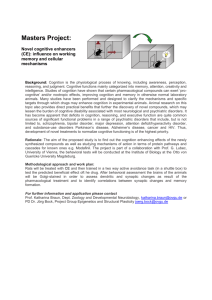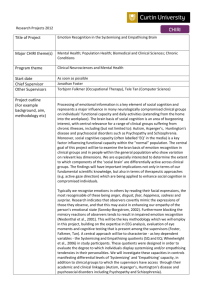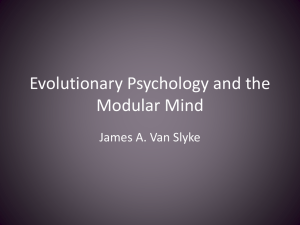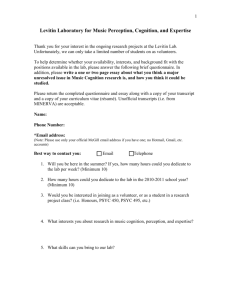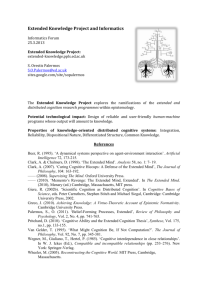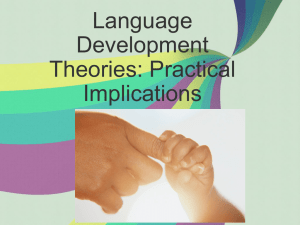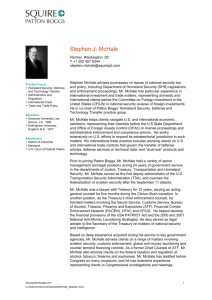Do you want to take part in Psychology research? This project is
advertisement
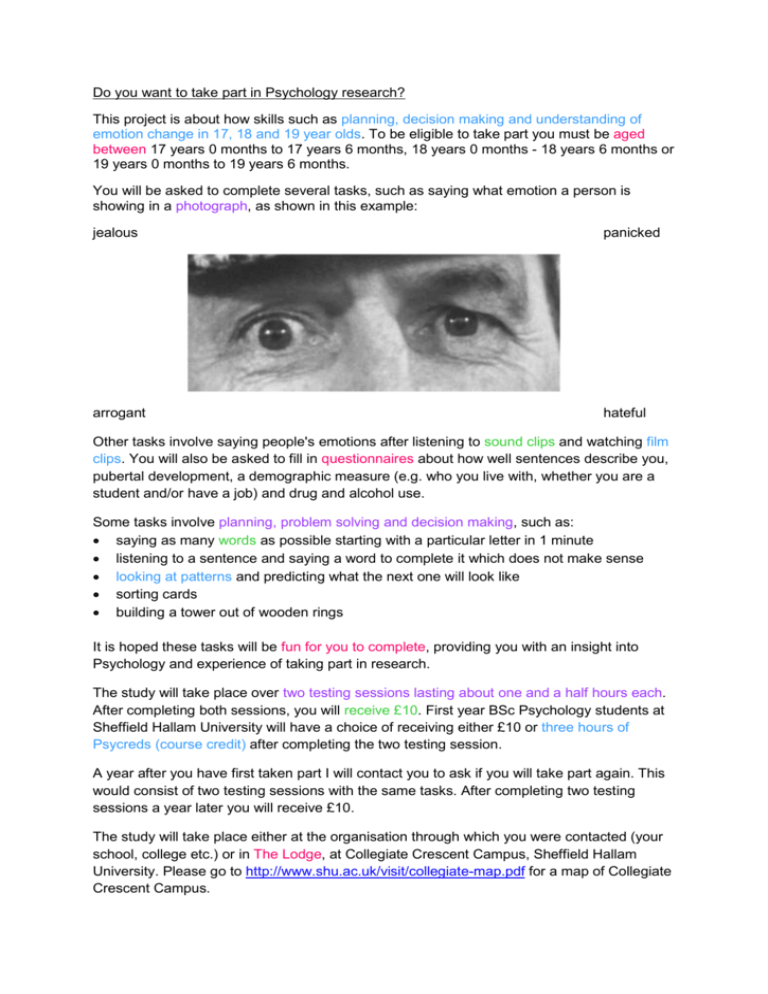
Do you want to take part in Psychology research? This project is about how skills such as planning, decision making and understanding of emotion change in 17, 18 and 19 year olds. To be eligible to take part you must be aged between 17 years 0 months to 17 years 6 months, 18 years 0 months - 18 years 6 months or 19 years 0 months to 19 years 6 months. You will be asked to complete several tasks, such as saying what emotion a person is showing in a photograph, as shown in this example: jealous panicked arrogant hateful Other tasks involve saying people's emotions after listening to sound clips and watching film clips. You will also be asked to fill in questionnaires about how well sentences describe you, pubertal development, a demographic measure (e.g. who you live with, whether you are a student and/or have a job) and drug and alcohol use. Some tasks involve planning, problem solving and decision making, such as: saying as many words as possible starting with a particular letter in 1 minute listening to a sentence and saying a word to complete it which does not make sense looking at patterns and predicting what the next one will look like sorting cards building a tower out of wooden rings It is hoped these tasks will be fun for you to complete, providing you with an insight into Psychology and experience of taking part in research. The study will take place over two testing sessions lasting about one and a half hours each. After completing both sessions, you will receive £10. First year BSc Psychology students at Sheffield Hallam University will have a choice of receiving either £10 or three hours of Psycreds (course credit) after completing the two testing session. A year after you have first taken part I will contact you to ask if you will take part again. This would consist of two testing sessions with the same tasks. After completing two testing sessions a year later you will receive £10. The study will take place either at the organisation through which you were contacted (your school, college etc.) or in The Lodge, at Collegiate Crescent Campus, Sheffield Hallam University. Please go to http://www.shu.ac.uk/visit/collegiate-map.pdf for a map of Collegiate Crescent Campus. All information collected will be kept confidential and will only be made available to myself and my supervisors. Data will also be anonymous, so your name will not be on your paperwork. Instead, a unique ID code will be created. You are free to withdraw your data up to a week after data collection, both when you first take part and also at the second testing session one year later. You are free to withdraw at any point during the study and up to a week after data collection. You do not have to give a reason. This project has been approved by Sheffield Hallam University’s Research Ethics Committee and is supervised by Dr. Lynne Barker, Dr. Lisa Reidy and Dr. Sue McHale. Supervisors' contact details: Dr. Lynne Barker l.barker@shu.ac.uk Dr. Lisa Reidy l.reidy@shu.ac.uk Dr Sue McHale s.mchale@shu.ac.uk 0114 225 5379 0114 225 5813 0114 225 2409 If you are interested in taking part or have any questions please email Sophie Taylor on s.j.taylor@shu.ac.uk or call me on 0114 225 5845. The Science bit The tasks about understanding emotion are social cognition tasks, which is the perception and interpretation of social situations (Fiske and Taylor, 2008). Brain imaging studies have shown that the prefrontal cortex (the front part of the brain) is used when completing social cognition tasks (Frith & Frith, 2003). The tasks involving decision making and planning test executive function. These tasks also use the prefrontal cortex (Rubia et al, 2003). Brain changes continue into late adolescence and adulthood (Barker et al, 2009, under review). It is thought that social cognition and executive function skills continue to develop in late adolescence due to the brain changes occurring at this time (Blakemore & Choudhury, 2006). Previous social cognition studies have focused on as research has predominantly focused on children e.g. 8 to 12 year olds (Golan, Baron-Cohen & Golan, 2008) or adults e.g. 22 to 62 year olds (Dziobek et al, 2006). Social cognition studies have involved participants with atypical development, e.g. children and adolescents with Asperger’s Syndrome (e.g. Kaland et al, 2008) and Traumatic Brain Injury (e.g. Stronach & Turkstra, 2008). Executive function studies have also included participants with atypical development, such as Traumatic Brain Injury (e.g. Barker et al, 2009, under review) and depression (e.g. Kyte, Goodyer and Sahakian, 2005). De Luca et al (2003) examined executive function in 8 to 64 year olds and suggested future research should use a longitudinal design to better identify how abilities improve and decline over time. A longitudinal design will be used in this study, with participants having the opportunity of taking part again one year after first completing the tasks. This research will provide a valuable contribution to the development of social cognition and executive function in late adolescence and early adulthood. References Barker, L. A., Andrade, J., Morton, N., Romanowski, C. A. & Bowles, D. (2009) The latent deficit hypothesis. Age at time of injury, executive functions and social cognition. Neuropsychologia, under review. Blakemore, S.-J. & Choudhury, S. (2006) Development of the adolescent brain: Implications for executive function and social cognition. Journal of Child Psychology & Psychiatry, 47 (3/4), 296-312. De Luca et al (2003) Normative data from the CANTAB 1: Development of executive function over the lifespan. Journal of Clinical & Experimental Neuropsychology, 25 (2), 242254. Dziobek, I., Fleck, S., Kalbe, E., Rogers, K., Hassenstab, J., Brand, M., Kessler, J.,Woike, J. K., Wolf, O. T. & Convit, A. (2006) Introducing MASC: A movie for the Assessment of Social Cognition. Journal of Autism & Developmental Disorders, 36, 623-636. Fiske, S. T. & Taylor, S. E. (2008) Social cognition: From brains to culture. London: McGrawHill. Frith, U. & Frith, C. D. (2003) Development and neurophysiology of mentalizing. Philosophical Transactions of the Royal Society London B, 358, 459-473. Golan, O., Baron-Cohen, S. & Golan, Y. (2008) The Reading the Mind in Films Task [Child version]: Complex emotion and mental state recognition in children with and without Autism Spectrum Conditions. Journal of Autism & Developmental Disorders, 38 (8), 1534-1541. Kaland, N., Callesen, K., Moller-Nielsen, A., Mortensen, E. & Smith, L. (2008) Performance of children and adolescents with Asperger’s Syndrome or High Functioning Autism on advanced Theory of mind tasks. Journal of Autism & Developmental Disorders, 38, 11121123. Kyte, Z. A., Goodyer I. & Sahakian, B. (2005) Selected executive skills in adolescents with recent first episode major depression. Journal of Child psychology & Psychiatry, 46 (9), 9951005. Rubia, K., Smith, A. B., Brammer, M. J. & Taylor, E. (2003) Right inferior prefrontal cortex mediates response inhibition while mesial prefrontal cortex is responsible for error detection. Neuroimage, 20, 351-358. Stronach, S. T. & Turkstra, L. S. (2008) Theory of Mind and use of cognitive state terms by adolescents with traumatic brain injury. Aphasiology, 22 (10), 1054-1070.
